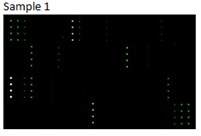How do you detect 300 specific glycan binding proteins in one experiment? Well, in this post we’ll answer this question by introducing the new Glycan Array, developed by RayBiotech for your cell signalling studies.
Glycocalyx is an extracellular polymeric coating surrounding many prokaryotic and eukaryotic cells. It consists of glycoproteins, glycolipids, proteoglycans, and glycosaminoglycans.

These constituents play an important role in the processes of cell signalling, virus transfection, and immunity. However, the range of detection tools available for glycobiology research have been limited… until now!
Cell Signalling Glycan Array: Detects 300 specific glycan binding proteins
With the Glycan Array 300 (cat. nr GA-Glycan-300-1), it is now possible to easily detect glycan binding proteins in one single experiment using the microarray technology.
RayBiotech have developed the largest commercially available glycan array for screening protein-carbohydrate interactions in cell signalling events to help you:
- Identify the glycans’ binding partners in biological samples
- Identify whether target proteins are carbohydrate binding proteins
- Probe binding of viruses and whole cells to glycans
- Profile the substrate specificity of enzymes (glycosyltransferases, glycosidases, etc.)
- Profile the inflammatory immune response
The 300, HPLC purified, synthetic glycans featured in the new generation Glycan-300 array consists of four groups of targets including:
- The 100 glycans from the Raybio Glycan-100 array
- An additional 80 N-glycans
- 50 glycolipid glycans
- 50 human milk oligosaccharide glycans

The included glycans have been frequently identified as structures showing important binding functions in the literature. For example:
- A variety of sialosides that have been shown to bind to the influenza virus with a serotype-specific pattern
- Galectins, which are involved in apoptosis, cell adhesion and T-cell activation suppression, function by binding beta-galactosides
- Glycosphingolipids knwon to interact with growth factor receptors to modify signal transduction & cell signalling or with bacterial toxin subunits to induce cell apoptosis
- Oligosaccharides from human milk that bind to microbes to promote growth of normal flora and inhibit pathogens in the gastrointestinal tract
This Glycan 300 array provides a powerful tool for researchers in glycobiology and other fields like cell signalling.
- Access to the full list of Glycan 300 here
- Download the Glycan structures here
Other RayBio Glycobiology Arrays for your cell signalling studies
Glycan 100 Array
In addition to the Glycan Array 300, a smaller version for the detection of 100 different glycans. The 100, HPLC purified, synthetic glycans featured in the Glycan Array 100 are the most frequently identified structures showing important binding function in the literature.
Lectin Array 70 & 95
Lectins are glycan-binding proteins which have been purified from trees, beans and some fruits. They are highly specific for a given glycan based on their sequence and the different sugar unit structures the glycan contains.
The RayBiotech Lectin Array 70 & Lectin Array 95 provide a powerful tool for glycosylation determination, drug discovery and biomarker development; all with limited samples volumes required.
When (and why) should you decide to outsource your cell signalling assay?
 Apart from the obvious considerations (lack of human resources to perform your project, need to hurry up your experiments to match a deadline, lack of equipment..), there may be other reasons to rely on tebu-bio’s lab expertise to perform your Glycan profiling & biomarker quantification for you. If you are on a one shot experiment where you want to optimize your results and benefit from our expertise, outsourcing may be a better choice than doing it yourself. Although the technology is quite simple, tebu-bio’s lab is very experienced and is likely to generate better quality data than you would in a single trial.
Apart from the obvious considerations (lack of human resources to perform your project, need to hurry up your experiments to match a deadline, lack of equipment..), there may be other reasons to rely on tebu-bio’s lab expertise to perform your Glycan profiling & biomarker quantification for you. If you are on a one shot experiment where you want to optimize your results and benefit from our expertise, outsourcing may be a better choice than doing it yourself. Although the technology is quite simple, tebu-bio’s lab is very experienced and is likely to generate better quality data than you would in a single trial.



